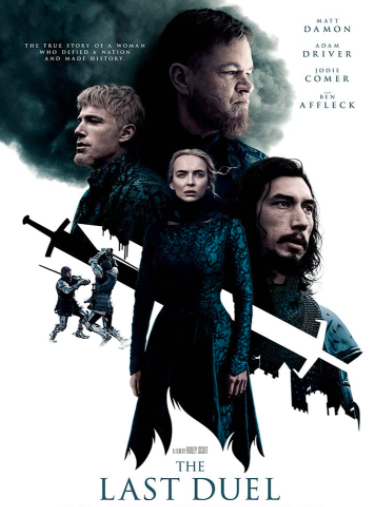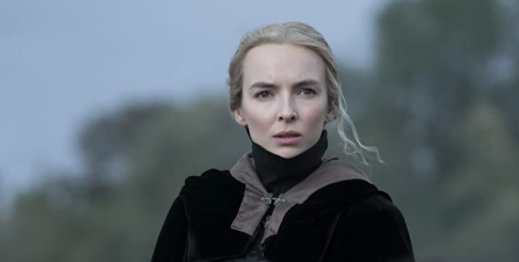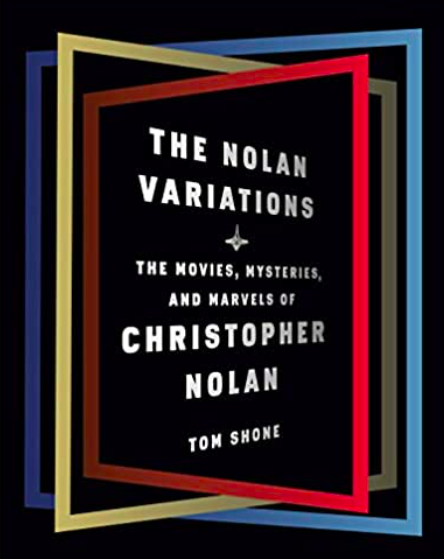HOLDING COURT: The Last Duel, Christopher Nolan, and The Bible Project
Welcome to a new blog series here at The Fear of God. HOLDING COURT, a series by FoG Legal Counsel, Dave Courtney (get it?), where he plays both defense and prosecution, making airtight cases for the media he’s consuming; be it horrific, holy, or somewhere in the middle. Friends and FoGgers, all rise, because HOLDING COURT is now in session…
There is no shortage of think pieces weighing in over the past couple of weeks on Ridley Scott's much anticipated and recently released Medieval epic, The Last Duel. Having recently read Eric Jager’s non-fiction book by the same name, and having seen the adaptation, I found both to be riveting and highly engaging works in their own way. Where the book offers a broad scale look at the real world historical context, the film, which brings the period setting to life through wonderful set design and an understated, muted cinematography, functions more as an interpretive exercise, using the three main and competing perspectives that inform the story’s unfolding and persisting conflict as a way into the larger world that these three individuals occupy. This probably sounds like a lofty claim, but I think this just might be one of Scott's best works, and for me definitely one of the films of the year. It feels unfortunate then to note that many of these think pieces have been obligated to document the films failed performance at the box office, for which there is no shortage of opinions as to why, including specific critiques surrounding Scott’s choice of narrative structure, with some wondering about his decision to frame the story around these three perspectives and to give the two men in the story equal attention.
This had me thinking about this critique as I tried to reconcile why the film landed for me in such a powerful way. It wasn’t until I came across a podcast episode by the Bible Project called Literature For a Lifetime, part of their current series on paradigms through which to understand the Bible as ancient literature, that I was able to find the words to express what I was feeling, a way to make sense of why I found the story powerful, why I think some resist it, and why I think the story structure is so important for communicating what this story desires to say.
Literature For a Lifetime
Continuing with the different paradigms, hosts Tim, Jon and Carissa have been walking through the past month, the episode Literature For a Lifetime deals with the Bible as "meditation literature", suggesting that this ancient form of storytelling is "designed not to give up all of its meaning on the first or even the fiftieth reading." Taking this further they suggest that, "Biblical literature constantly challenges our assumptions about what is", and that the word "meditation" contains the idea of necessarily making the space to dwell on words, visuals, and ideas so that the truths contained within the story can emerge. In particular, ancient Jewish Literature is "artistically designed to interpret itself and encourage a lifetime of re-reading and reflection."
Unfortunately, particularly here in the West, we have become conditioned to reading and seeing story in linear ways that demand a particular, singular progression of thought. Even when we do encounter these ancient forms of storytelling (see the Greek Myths, which have had an immense influence on western society, or even in a more modern sense the popular Ghibli films, which employ a circular structure) there is a tendency to filter them through our modern, western paradigms.
The Last Duel
So how does this connect to The Last Duel? Ridley Scott is employing an ancient form of non-linear storytelling, establishing the Duel as a bookend and using the three main voices as a way for the truth contained within the story to transcend the reality of these contradictory testimonies. I encountered a number of think pieces that miss this basic fact, suggesting that in a story that revolves around two men with power fighting over the accusation of rape of a single woman without power (which is tactfully represented and not exploited), it feels uncomfortable and even morally wrong to do anything but clearly condemn these two men, dismiss their testimonies, and vindicate Marguerite. Thus they question why we needed to tell this story in this way at all if we already know the truth of their claims. However, it is worth considering that in our understandable rush to see this story from a modern, feminist perspective, and to position it within a clear, linear movement from a less enlightened age to a more enlightened one, we stand to miss the ways in which Scott’s particular choice of story structure can in fact help to illuminate this history and invite us into conversation with it in ways we otherwise wouldn’t.
To connect this back to the Bible Project episode, this is the kind of story structure that we can expect will reveal something new each time we encounter it, including the replaying of the same scenes from three different perspectives. It allows us to step into the story at any point in space and time and read it backwards, forwards, upside down, finding the same ideas and lessons, the same patterns and symbols, being revealed with fresh perspective.
Purely speaking on a technical level, the way this seasoned Director takes the source material and breaks it down into 3 main perspectives, which is structurally divided into three separate acts each written by different persons (two men and one woman), is an effective way for Scott to immerse us in a world where such a duel could be considered proper justice. The editing is especially effective here, as with each added perspective the gaps in the narrative slowly begin to fill. By the time we get to the third perspective, Marguerite’s, played to perfection by the absorbing Jodie Comer, we are able to then contrast the three perspectives so as to gain the bigger picture, giving us a fuller sense of what precisely was at stake in the duel. These editing choices use points of transition within the story that feel awkward and disjointed early on to play with things like camera angles and points of view. A subtle facial gesture, a background detail, these things are used to define how these three people see the same event differently, gradually expanding our own point of view. This makes it ripe for rewatches as each scene leaves plenty to dissect and meditate on in terms of these smaller and more concise details.
Now, here it is important to address the elephant in the room, a point that is perhaps made more apparent in the book with its interest in the historical account. The reason we are still talking about this story at all is because these three perspectives remain at odds. We simply don't know definitively which perspective is the truth, and there is good evidence for and against all three. Further, the most compelling evidence we have for all three testimonies is the simple fact that not one of them changed their story at any point of time, even when it became clear what the outcome would be. To this end, Scott is careful not to impose his own judgment of the characters or to make anyone the hero or the villain using his own voice. Rather he allows these characters the freedom to tell their own stories, to make themselves the heroes of their own stories, and brings in the historical backdrop as a way of measuring the larger truth, the bigger ideas about equality and oppression that these testimonies point towards, largely by strategically positioning Marguerite’s testimony as the final one. The uncertainty of these three points of perspective, what we don’t know, is able to coexist with what we do in fact know about the larger historical backdrop, inviting us into a conversation about the bigger ideas at play. And here is what is most important- as good readers of scripture we must be able to leave room for uncomfortable aspects of history to exist alongside the truth the writers are trying to illuminate. As good viewers of The Last Duel we must leave room for the uncomfortable aspects of the story to exist alongside the truth that Scott is trying to illuminate. The truth, then, is not dependent on the people and characters within scripture getting everything right. Nor is it dependent on the characters represented in the Last Duel getting everything right. The truth necessarily transcends this reality, and it requires work to uncover, which is precisely what good literature and film can help us to do using these kinds of story structures.
The Nolan Variations: The Movies, Mysteries and Marvels of Christopher Nolan
This might feel like a rabbit trail, but bear with me, as I think this can help further accentuate this point. In the aforementioned episode of the The Bible Project, the hosts reference Nolan's recent film Tenet as a way of underscoring how it is that these ancient forms of storytelling work, effectively connecting it then to a modern example. This is actually what helped to give me the words to describe my own experience with The Last Duel, connecting my thoughts directly not only to this film, but also to a book I am reading right now by Tom Shone called The Nolan Variations: The Movies, Mysteries and Marvels of Christopher Nolan.
As was mentioned earlier, one of the key characteristics of scripture as meditation literature, and of Tenet, and The Last Duel as ancient, non-linear forms of storytelling, is that they are able to move us forwards and backwards at the same time, inverting our sense of space and time so as to consistently double us back on the same scenes or interconnected scenes with a fresh sense of what these scenes desire to say. But it does so in real time, revealing a larger narrative that then emerges within our immediate point of view at the same time. This is how the truth transcends the story. To make this point the hosts speak to the intimate relationship between Tenet, which forms the second last chapter of Shore’s excellent and informative book on Nolan, and an ancient Latin Roman puzzle called The Sator Square, which utilizes what is called a palindrome, words that read the same way backwards and forwards, upwards and downwards, and in which a central word (Tenet) informs its center. Nolan writes this idea directly into the fabric of Tenet’s script, a film that also created a bit of a stir regarding its confusing choice of a less than linear story structure, moving us backwards and forwards in time using the words contained in the Sator Square- Sator, Opera. Rotas, Arepo, and Tenet. In the ancient world Sator means sower, Arepo is a name, Tenet means has done or does, Opera means work, and Rotas is the word for plow. This phrase then become the means by which we can understand the bigger story, with the word “tenet” functioning as an active and participatory and even invitational word at its center.
As Shore points out in his book, Nolan’s interest is in using story to help reconnect the broken bridges between the hard sciences and the metaphysical, giving us the means to then search for the transcendent in an otherwise cold and emotionless universe driven by the laws of nature. The word tenet can connotate belief or inspire the existential concerns for what and why something is, and this idea of faith in something beyond mere determinism plays a central role in many of Nolan's stories, tying this directly to the function of space and time within a metaphysical or spiritual reality. He is unsettling our perspective and refocusing our attention on a greater truth about the reality of the universe, much in the same way the Sator Square in its own ancient context looked to bridge science (how we perceive reality) with truth (how we make sense of reality through theology/philosophy/metaphysics) in its specific religious context.
Like Tenet then, and like the ancient scriptures, the structure in The Last Duel works to bridge our perception of reality with the truth that needs to be revealed. In this sense it puts us into conversation with history as an unfolding narrative rather than making us history's judge and jury. Which is a crucial point, lest we either ignore and forget history altogether or turn history into an idol, shaping it in our own image and giving it an agency it otherwise wouldn’t have. We end up assuming a meta-narrative that sits detached from history that has no true core, no central word, leaving it entirely contingent on our success and the story’s progression while disguising where precisely it is that we and it are headed. Worse yet, this tends to ignore how history can challenge our own perspective as we sit in relationship to it.
One final word on this. While this can apply to different forms of ancient storytelling and span religious expression, in a specifically Judeo-Christian context what’s informing about the paradigms the Bible Project brings to light is recognizing how from this point of perspective virtually the whole of scripture becomes a retelling of the Genesis-Exodus story, moving us backwards and forwards in space and time and replaying the same scene over again in different contexts even as the larger narrative continues to emerge in real time, ultimately finding its fullest expression in Christ, the word that then occupies the story's center. Miss this and we miss the truth of Christ. We become liable to make the story of Christ contingent on the failed or successful witness of the people who are participating in the Christ story, which in scripture is all of us. We might fail to see the truth which is in fact inhabiting a story that is full of things like violence and retribution and rape, thus forcing us to either abandon the history of the text altogether as irreconcilable or making ourselves the author of it, appealing to our more enlightened state of mind and rewriting it in a way that suits the story we need it to tell in our present context. The real problem here is that we then miss the direct appeal to truth as a transcendent reality. We might miss the cries of the witnesses within its pages that are caught up in a shared concern for the what and the why. We form the truth in our own image, making ourselves judge and jury over the past rather than allowing the past to inform the present, thus helping to shape our future trajectory rather than binding us to our successes and our failures. It brings us into conversation with history itself, and thus into conversation with Christ.
This is, I am inclined to posit, why we see cycles of disenchantment and the continued need and desire for re-enchantment as a common refrain expressed in every society throughout history, be it in our individual lives or in our communities. To this end, The Last Duel is a helpful reminder of how to do history well, to allow it to re-enchant us with the same truth that informs the oppression of such a historical context. For me, this plays into why I feel The Last Duel is a uniquely constructed historical epic told with a very real, personal and intimate touch, why I think some seem to be resisting it, and why I think it has some important things to say about our present day, should we be open to the conversation.






